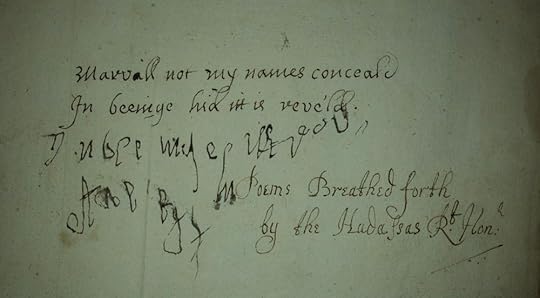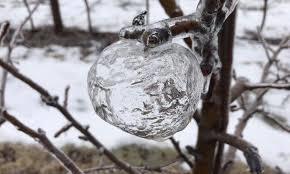Greer Gilman's Blog, page 19
April 23, 2019
Willing
In his honour, here's that masterpiece of stop-motion animation, my beloved Next: The Infinite Variety Show. Spot all the plays! I am sorry for the sadly bleared video. The only sharper version I could find is a half-minute extract from BFI, which at least will give you some idea of its beauty; its wit, I think, is evident.
Nine
April 22, 2019
Peace, peace, Mercutio, peace! Thou talk'st of nothing
The great beech at Mount Auburn is gone. The one like a fusion of elephants, with leaves like porphyry. I walked in at the gate and didn't know where I was.
At least the bees on the rooftops of Notre Dame survived the fire.
Nine
April 15, 2019
Requiem
And Gene Wolfe was a kind man, and a very great writer.
Nine
April 4, 2019
After the Ides of March
Nine
March 21, 2019
"Shee was another World"
Here is the epigraph:

He had discovered Lady Hester Pulter (ca 1607–1678), an unknown poet of the 17th century.
Her scant biography will give you no idea of her attainments. Her father, a Lord Chief Justice and Lord High Treasurer, was created Earl of Marlborough under Charles I. She was born in Ireland, and was married at thirteen or maybe fifteen to one Arthur Pulter of Broadfield Hall, near Cottered in Hertfordshire. She bore him fifteen children; thirteen of them died. She lived in isolation and perpetual mourning, for her children and her king, in a flintily Puritan county. She gardened a great deal. Some of her long circumstantial headnotes may suggest mere complaint and conventional piety.
“This was written 1648, when I Lay Inn, with my Son John, beeing my 15 Child, I beeing soe weak, that in Ten dayes and Nights I never moved my Head one Jot from my Pillow, out of which great weaknes, my gracious God restored me, that I still Live to magnifie his Mercie.”
The poetry is something else.
In spirit, the poet rises from her sickbed:
Up to that Spheir where Nights Pale Queen doth run
Round the Circumference of the Illustrious Sun
Her Globious Body Spacious was and Bright
That Half alone that from Sols Beams had light
The other was imured in shades of Night
Nor did shee seem to mee as Poets fain
Guiding her Chariot with A silver Rein
Attir’d like som fair Nimph or Virgin Queen
With naked Neck and Arms and Robes of Green
Love sick Endimion oft hath thus her seen
But as my thoughts about her Orb was Hurld
I did perceive Shee was another World
Thus beeing in my Fancie raised soe fare
This World apear’s to mee another star
And as the Moon a Shadow Casts and Light
Soe is our earth the Empres of their Night
Wait, did she just imagine seeing earthrise from an orbit round the moon? She did.
Hers is a Copernican universe; she nods to the Galilean moons as she flies past:
Next Jupiter that Mild Auspicious Starr
I did perceive about his Blazing Carr
Four bright Atendents always hurrid Round...
Yet Pulter is no luftmensch. In a fiercer political vein, she writes of a kingdom overrun with locusts:
Then ibis came and did these worms destroy,
But with his putrid filth he ten times more
Afflicted them than they were e’er before.
The ibis, she notes in the margins, is Cromwell, shovelling up and shitting out corruption.
So: a melancholic, a Copernican, a Galilean, an impassioned Royalist, a political satirist—oh yes, and a botanical alchemist:
View but this tulip, rose, or gillyflower,
And by a finite, see an infinite power.
These flowers into their chaos were retired
Till human art them raised and reinspired
With beating, macerating, fermentation,
Calcining, chemically, with segregation;
Then, lest the air these secrets should reveal,
Shut up the ashes under Hermes’s seal;
Then, with a candle or a gentle fire,
You may reanimate at your desire
These gallant plants; but if you cool the glass,
To their first principles they’ll quickly pass:
From sulfur, salt, and mercury they came;
When they dissolve, they turn into the same.
Then, seeing a wretched mortal hath the power
To recreate a Virbius of a flower,
Why should we fear, though sadly we retire
Into our cause? Our God will reinspire
Our dormant dust, and keep alive the same
With an all-quick’ning, everlasting flame.
Then, though I into atoms scattered be,
In indivisibles I’ll trust in Thee.
Then let this comfort me in my sad story:
Dust is but four degrees removed from glory
[...]
Then at thy dissolution patient be:
If man can raise a flower, God can thee.
An alchemist who wants to know: in what incarnate fraction of myself, what atom, does the soul reside? All of them at once? Donne calls upon “you numberless infinities / Of souls” and bids them “to your scattered bodies go.” Pulter imagines herself as the multitude, her own one scattered body as infinities of atoms, her indivisible ubiquitous soul awakening, “I know not how.” And she’s read (at least) a tiny bit of kabbala:
Dear Death, dissolve these mortal charms,
And then I’ll throw myself into thy arms;
Then thou may’st use my carcass as thou lust,
Until my bones (and little luz) be dust:
Nay, when that handful is blown all about,
Yet still the vital salt will be found out;
And when the vapor is breathed out in thunder
Unto poor mortals’ loss, or pain, or wonder,
And all that is in thee to atoms turned,
And even those atoms in this orb is burned,
Yet still that God that can annihilate
This all, and it of nothing recreate,
Even He that hath supported me till now,
To whom my soul doth pray and humbly bow,
Will raise me unto life. I know not how.
That “little luz” (the notes inform us) “is a ridiculous fable, which the Cabalists relate of a certaine Vertebra ... which they have termed Luz, out of which as from a seed, the Bones shal be regenerated and spring up at the General Resurrection.”
Pulter’s constant theme is of liberation by dissolution. Over and again, she envisions rising out of her confinement (and confinements) as a cloud of atoms, out which of which will come another self, another world. It’s her own paradoxical belief, a Lucretian mysticism
For I no liberty expect to see
Until to atoms I dispersed be,
Then being enfranchised, free as my verse,
I shall surround this spacious universe,
Until by other atoms thrust and hurled
We give a being to another world.
Nine
March 12, 2019
Admissions of guilt
"And I’ve created this side door in.”
Despicable.
Nine
February 17, 2019
Cosmopoiesis
I hope that someone took notes on those other panels, because all I have are the jottings I prepared, and I would love to put them in the context of the conversations. I remember that on the first, I spoke about Macbeth and equivocal prophecy. and The Owl Service: "she wants to be flowers and you make her owls."
For "Woods," I quoted Angela Carter:
“The English wood is nothing like the dark, necromantic forest in which the Northern European imagination begins and ends, where its dead and the witches live....An English wood, however marvellous, however metamorphic, cannot, by definition, be trackless, although it might well be formidably labyrinthine. Yet there is always a way out of a maze ... But to be lost in the forest is to be lost to this world, to be abandoned by the light....That forest is haunted; this wood is enchanted.”
I love that passage.
Topics touched on included Dante, Mr. Badger, my own Cloudwood, Arthur Rackham and the evil of all roots, A Midsummer Night's Dream, the New-World horror film, The Witch, "The Teddy Bears' Picnic," "Tam Lin" and eyes of tree, rootedness, skylessness, eye-of-sky bluebells in beech woods, the Chalk as stronghold surrounded by trees.
On elves, I quoted Shakespeare again:
“Ye elves of hills, brooks, standing lakes and groves,
And ye that on the sands with printless foot.
Do chase the ebbing Neptune and do fly him...”
He pinched that from Ovid; but if you turn to Medea’s invocation in the Metamorphoses, she begins by summoning "airs and breezes, mountains, rivers, pools." They are understood to be animate, essentially. Shakespeare turns that over in "the ebbing Neptune": the god is essentially ocean, the ocean is a god. Elves are not aliens—this is their earth more than ours.
Since I'd been steeping for a week or two in Crowley, of course I had to quote Violet Bramble: "they mean no good to us. they mean us no harm either.”
And I slipped in a quip from my Kingdoms of Elfin preface: they are "particles with charm and strangeness—Huons?"
We all talked about the Cottingley photographs and indeterminancy of scale.
I very much hope that the Crowley panel will be available online. His editor at Saga Press, Joe Monti, moderated; Rich Horton, Steve Popkes, Faye Ringel, and myself conversed. From his editor, we learned that a Crowley manuscript is Nabokovian in its near-perfection. From the notes I brought and others that I scrawled in margins, I see that that I talked about cosmopoiesis, “spheres of bright complexity made only of making” (Engine Summer); of Crowley's perfect command of cadences; of his use of a sublime vernacular, a transcendent demotic; of the interversible otherwise ("Was there any thought about them she could have whose opposite wasn’t true?"); of snakes' hands (in a burst of madness, I coined the adjective "herpetomanual"). And somewhere in the onrush of words I realized that that the Aeolian harp in the Aegypt quartet—the finial, the culmination of the tale—is like Smoky at the end of Little, Big ("something that begun to open in his heart opened further; it let in great draughts of evening air...") is like Rush that Speaks in Engine Summer: all are the instruments of Story, all perfected in their vulnerability. All played upon by chance.
Well, that was a blast.
Among other standouts at the con: There was a brilliant dissection of Joseph Campbell's monomyth by Auston Habershaw (doesn't that name sound like a minor Crowley character?), John Clute, Teresa Nielsen Hayden, F. Brett Cox, and Faye Ringel. Elizabeth Hand (the guest of honor) read from and discussed Curious Toys, her long-awaited novel on the outsider artist Henry Darger.
I had some very pleasant conversations, saw a number of old friends from out of town, had some hopeful intimations and a compliment or two. Boskone always has a good dealer's room, nearly all books, and Small Beer Press had a sale...Hey, I even bought two small prints from the art show: a veiled lady in moonlight, from a scratchboard original by Kate Adams, and an elf in a bramble bush by Lauren A. Mills.
One terrible disappointment: Boskone has always run an awesome consuite/green room rolled into one. There was always a vast range of basics: coffee (with every syrup imaginable); black, green, white, and herbal teas; every sort of milk (from half and half to soy and almond); weird and common sodas; slushy machines; mountains of donated bread from artisan bakeries; scores of dozens of hard-boiled eggs; butters; cheeses; jams; nut butters of all sorts; breakfast pastries; fruits; cookies; lox (if you came early enough); whatever else came to hand. A cornucopia. And given the isolation of the Westin Wilderness, this bounty was an absolute lifeline. Well, this year the hotel cracked down. Nothing was to be served, except mingy pre-wrapped snackoid bitelets. The Westin didn't even put water pitchers on the panel tables, and (I was told) forbade the gophers their own outside beverages. A huge blow, especially as so many of us were reckoning on that consuite bounty for most of our meals.
Bracketing this fair-fortuned con were two near-catastrophes: both averted. The night before it, to my horror, I couldn't find some vital files on my hard drive. There arose nightmare visions of a virus, eating up my life's work like an army of moths. Fortunately, when I ran diagnostics, the problem was only a mislaid pathway, which could be repaired by Disk Utility. Whew. After that, when my ink cartridges all suddenly ran bone dry before I'd printed one page of my notes, I could be philosophical.
Afterward, I was walking ![[personal profile]](https://i.gr-assets.com/images/S/compressed.photo.goodreads.com/hostedimages/1491408111i/22407843.png) negothick from a shared cab to the door of South Station, when I found myself flat on the pavement, pinned down by my book-filled backpack. An entire paving-stone had tipped up like a booby trap in a cartoon and slammed me down. Flying faceplant! Luckily, the counterweight of my rolled suitcase broke my fall a bit. No damage, except a skinned knee and a shaking up, but we complained to the station, and they said they'd cordon off the stone. The next victim, gods forbid, could be a frail old person, or someone with an infant in a sling.
negothick from a shared cab to the door of South Station, when I found myself flat on the pavement, pinned down by my book-filled backpack. An entire paving-stone had tipped up like a booby trap in a cartoon and slammed me down. Flying faceplant! Luckily, the counterweight of my rolled suitcase broke my fall a bit. No damage, except a skinned knee and a shaking up, but we complained to the station, and they said they'd cordon off the stone. The next victim, gods forbid, could be a frail old person, or someone with an infant in a sling.
Other than that, Mrs. Lincoln, a delightful weekend.
Nine
February 14, 2019
All in the morning betime
Agency and Free Will in Speculative Fiction
15 Feb 2019, Friday 18:00 - 18:50, Harbor III (Westin)
Fantasy often makes use of prophecy. But when a protagonist is the prophesied one, how can they experience true conflict, risk — or agency? They can’t fail, right? Shouldn’t this deflate the reader’s interest? What happens when you have conflicting prophecies? And if we’re in a mechanistic universe, governed by the laws of physics, where is free will?
Juliana Spink Mills (M), Gillian Daniels, Rebecca Roanhorse, Greer Gilman, M. C. DeMarco (mcd@mcdemarco.net)
Where Do Elves Come From?
15 Feb 2019, Friday 21:00 - 21:50, Harbor II (Westin)
Elves have their roots deep in northern European folklore, and their branchings support much of modern fantasy literature. Why? What makes elves so interesting? Are there different kinds of elves? Are Tolkien's elves — beings who are almost preternatural humans — different in kind from cute Victorian elves, or from the grimmer elven folk of Poul Anderson's The Broken Sword? And what about the modern elves that appear in the night in many urban fantasies — why are they there? What's the significance of a separate magical or supernatural race of human-like beings?
Melanie Meadors (M), Sarah Smith, Elwin Cotman, John Clute, Greer Gilman
Lost in the Woods
16 Feb 2019, Saturday 11:00 - 11:50, Marina 4 (Westin)
Characters in fantasy, dark fantasy, and horror often find themselves lost in the woods — with the story's plot hanging over their heads, waiting to drop. What is it about this particular setting that is so well suited for a suspenseful story? Or are authors, especially modern-day authors, using the woods as a metaphor for the city ... or vice versa? What is it about the woods and nature that is so unsettling?
Paul Tremblay, Christopher Irvin, John Langan (M), Erin Roberts, Greer Gilman
The Work of John Crowley
16 Feb 2019, Saturday 18:00 - 18:50, Marina 4 (Westin)
John Crowley is an author with a powerful gift for examining what he describes as "the human condition and the human situation as it is now." Let's explore his works and try to understand his influences — from Byron to Le Guin — as well as how his fictions have influenced others. From Little, Big to Ka, where should a reader who is new to Crowley start? What expectations should we leave behind as we move more deeply into the worlds he's created?
Rich Horton, Joe Monti (M), Faye Ringel, Steven Popkes, Greer Gilman
Reading by Greer Gilman
17 Feb 2019, Sunday 14:30 - 14:55, Griffin (Westin)
Nine
February 9, 2019
Ghost apples

Cast in ice by the lost-sauce method, in the polar vortex: a fortuitous Goldsworthy, an unwritten poem.
Many thanks to
![[personal profile]](https://i.gr-assets.com/images/S/compressed.photo.goodreads.com/hostedimages/1549828907i/27044247.png) rushthatspeaks
for this image.
rushthatspeaks
for this image.It's been a serendipitous winter for secondhand book-finds: Andy Goldsworthy : ephemeral works, 2004-2014 (wood, water, ice, rock, shadow, leaves, petals, and some new work using pollen or chalk-dust to reify light); two volumes of the Library of America Le Guin (I sat straight down and reread Orsinia); The Art of Florence in two volumes and a slipcase, weighing rather more David's left thigh, and I could have used some Tuscan quarrymen to lug it home); A.S. Byatt's Peacock & Vine : on William Morris and Mariano Fortuny; The Voynich manuscript in full facsimile...
Oh, reason not the need!
And speaking of utterly unneeded frivolities, I broke down and got that wooden jigsaw of the Primavera I've been sighing over for years. So far, I've just sifted through the pieces, admiring: leaves, flowers, fairies, a lion and a unicorn, Pegasus, a griffin, a green man, a centaur, a satyr, a salamander, musicians, dancers, acrobats, an endless knot like the soundhole of a lute. Now all I need is a table to do it on.
Nine
Nine
February 4, 2019
The Complete Arkangel Shakespeare
Enjoy!
Nine
P.S. Alex Jennings!
Greer Gilman's Blog
- Greer Gilman's profile
- 42 followers



